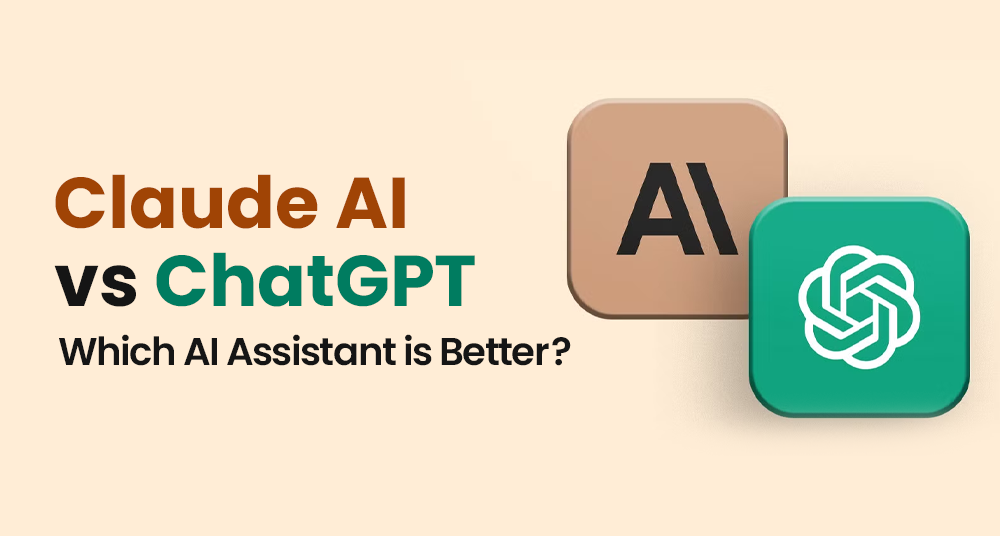Artificial Intelligence (AI) has rapidly transformed the way we create, communicate, and compute. Among the leaders of this transformation are two AI powerhouses — Claude AI by Anthropic and ChatGPT by OpenAI. Both are cutting-edge conversational AI models that have redefined how people interact with technology. As 2025 unfolds, the competition between Claude AI vs ChatGPT has reached new heights, with each platform introducing advanced features, better contextual understanding, and improved reasoning abilities.
In this detailed comparison, we’ll explore everything you need to know — from their origins, models, features, and performance to real-world use cases, pricing, and which AI assistant might be the best for you.
Introduction: The Rise of Advanced AI Assistants
Over the last few years, AI chatbots have evolved from simple text generators to intelligent virtual assistants capable of deep reasoning, data analysis, coding, and creative tasks. OpenAI’s ChatGPT and Anthropic’s Claude AI are at the forefront of this evolution.
- ChatGPT, introduced in late 2022, became a cultural and technological phenomenon. With the launch of GPT-4 and later improvements like GPT-4 Turbo, it became a go-to assistant for professionals, students, and developers alike.
- Claude AI, released by Anthropic in 2023, positioned itself as a “safer and more ethical” conversational agent, emphasizing responsible AI alignment and large context processing.
Both tools have their strengths, and choosing between them depends on your specific needs — creativity, reasoning, coding, or business use.
Background and Development
ChatGPT by OpenAI
ChatGPT is powered by OpenAI’s GPT (Generative Pre-trained Transformer) architecture. The current 2025 version, GPT-5, builds upon its predecessors with multimodal abilities (text, image, voice, and code), making it more versatile than ever. It integrates deeply with tools like DALL·E 3 for image generation and Python for reasoning tasks.
OpenAI’s partnership with Microsoft has led to seamless integration with Copilot, Azure AI, and Office tools, boosting its enterprise appeal.
Claude AI by Anthropic
Anthropic was founded by ex-OpenAI researchers, including Dario Amodei, with the goal of developing AI that’s interpretable, safe, and aligned with human values. Claude 3, released in 2024, took a major leap by outperforming GPT-4 in certain reasoning and reading comprehension benchmarks.
Claude’s models (Claude 3 Haiku, Sonnet, and Opus) offer scalable AI assistance depending on complexity — from lightweight everyday queries to deep enterprise analytics.
Key Differences: Claude AI vs ChatGPT
| Feature | Claude AI (2025) | ChatGPT (2025) |
| Developer | Anthropic | OpenAI |
| Current Version | Claude 3.5 (Haiku, Sonnet, Opus) | GPT-5 (Turbo) |
| Focus | Ethical, safe, and context-rich AI | Versatile, creative, and multimodal AI |
| Context Window | Up to 1 million tokens (Claude 3.5 Opus) | Up to 128K tokens (GPT-5 Turbo) |
| Multimodal Support | Text and document analysis | Text, image, code, and voice |
| Data Analysis | Excellent with structured text | Integrated code interpreter and charts |
| Writing Style | Balanced, factual, and cautious | Creative, natural, and dynamic |
| Integration | Slack, Notion AI, and API access | Microsoft Copilot, Teams, Office |
| Pricing | Based on tiered usage | ChatGPT Plus / Pro subscription |
| Best For | Professionals, researchers | Creators, developers, and general users |
Performance and Accuracy
Claude AI Performance
Claude’s strength lies in long-context understanding. It can analyze massive documents, entire books, or research papers in a single go without losing coherence. This makes it invaluable for legal firms, researchers, and analysts.
Anthropic has heavily focused on Constitutional AI, a method where the model aligns its responses with ethical guidelines. This results in fewer hallucinations and more factual accuracy, though sometimes it feels conservative or reserved.
ChatGPT Performance
ChatGPT excels in creativity and versatility. It’s not only good at factual responses but also generates stories, marketing copy, scripts, and even poetry with a natural, human-like tone. The addition of real-time web browsing and image understanding gives it an edge for current and visually-rich content.
Its code interpreter makes it powerful for data analytics, Python coding, and visualization — something Claude handles less efficiently.
User Experience
Claude AI Experience
Claude offers a clean, professional interface with document upload capabilities (PDFs, DOCs, CSVs) that allow for deep analysis. It can summarize, critique, and reference within massive files with context retention that’s unmatched.
Its conversational flow feels logical and grounded, prioritizing accuracy over emotion. It’s ideal for users seeking clarity and dependability.
ChatGPT Experience
ChatGPT provides a highly interactive environment, supporting plugins, custom GPTs, and voice conversations. Users can switch between models, such as GPT-4 Turbo for advanced tasks or free GPT-3.5 for general queries.
It’s more user-friendly for creative brainstorming, app development, and content writing. Integration with image generation (DALL·E 3) and voice features makes it a more “personal” assistant.
Use Cases: When to Choose Each AI
When to Choose Claude AI
- Legal, academic, or research-based work requiring high context comprehension.
- Analyzing long documents or datasets.
- Teams prioritizing data privacy and AI ethics.
- Business reports, compliance summaries, or document intelligence.
When to Choose ChatGPT
- Content creation, copywriting, and social media strategy.
- Coding, debugging, and app development.
- Creative writing, storytelling, and idea generation.
- Visual and voice interaction with multimodal tasks.
Data Privacy and Ethics
Anthropic’s Claude AI was designed around “Constitutional AI”, meaning it follows a set of ethical rules that guide its behavior, ensuring it remains aligned with human values. This focus makes Claude slightly more cautious but safer for enterprise-grade use.
ChatGPT, on the other hand, benefits from OpenAI’s moderation system and transparency initiatives. However, as it integrates with third-party apps (via plugins or API), data privacy policies can vary depending on configuration.
For companies handling confidential or regulated data, Claude may provide a stronger sense of control.
Multimodal and Coding Capabilities
Claude AI
Claude can process various text formats and structured data files but lacks full multimodal capabilities (image and audio). However, its document intelligence is among the best — capable of analyzing contracts, reports, and papers with exceptional depth.
ChatGPT
ChatGPT, with GPT-5’s multimodal design, can see, hear, and speak. It interprets images, explains diagrams, and processes visual data. It also executes Python code, performs calculations, and builds charts — ideal for technical professionals and students.
Pricing Comparison
| Plan | Claude AI | ChatGPT |
| Free Tier | Claude 3 Haiku | GPT-3.5 |
| Paid Plan | Claude Pro (Sonnet/Opus models) | ChatGPT Plus ($20/month for GPT-4 Turbo) |
| Enterprise | Custom pricing with API | ChatGPT Enterprise with admin tools |
| API Usage | Pay-per-token | Pay-per-token |
Both offer API access for developers, but Anthropic’s tiered structure (Haiku → Sonnet → Opus) allows flexible scaling based on use complexity.
Integration and Ecosystem
Claude AI Integrations
Claude integrates with:
- Slack (for team AI assistance)
- Notion AI
- Anthropic API
- Several enterprise knowledge platforms
ChatGPT Integrations
ChatGPT’s ecosystem is far broader:
- Microsoft Copilot in Word, Excel, and PowerPoint
- Custom GPTs with API connections
- DALL·E 3 for design and image generation
- Voice support for natural conversation
ChatGPT’s versatility gives it a significant edge for both personal and enterprise users who need cross-platform AI functionality.
Accuracy and Hallucination Rate
In benchmark tests:
- Claude 3 Opus scored higher in reading comprehension and reasoning-based tasks.
- ChatGPT (GPT-5) performed better in creative writing, mathematics, and coding challenges.
Claude tends to give slightly shorter, factual answers, while ChatGPT offers detailed and expressive explanations. For critical business or academic work, Claude’s reliability is appreciated; for everyday use, ChatGPT’s flexibility shines.
Real-World Applications
Claude AI Applications
- Law firms: Contract summarization and legal compliance reports.
- Academia: Research paper synthesis and citation analysis.
- Finance: Regulatory data and market report summarization.
- Customer support: Context-rich query resolution.
ChatGPT Applications
- Marketing: Content creation, SEO writing, and campaign ideas.
- Education: Tutoring, concept explanations, and essay help.
- Technology: Code writing, debugging, and documentation.
- Design: Visual prompt generation and creative ideation.
Strengths and Weaknesses
Claude AI Strengths
Exceptional long-context memory (up to 1 million tokens)
High factual accuracy and low hallucination rate
Ethical and transparent alignment
Ideal for document-heavy workflows
Claude AI Weaknesses
No image or voice capability
Limited creative flair compared to ChatGPT
API still evolving for developers
ChatGPT Strengths
Multimodal (text, image, and voice)
Excellent creativity and reasoning balance
Integrates across Microsoft ecosystem
Custom GPTs and plugin support
ChatGPT Weaknesses
Shorter context window
Occasional overconfidence in factual errors
Limited enterprise data privacy without custom setup
User Community and Support
ChatGPT benefits from a vast global user community and frequent updates through OpenAI’s developer ecosystem. Tutorials, plugins, and prompt libraries make it easy to customize experiences.
Claude AI, while smaller in user base, has built a loyal professional following due to its stability and enterprise-friendly approach. Anthropic provides dedicated enterprise support and SLA-backed reliability.
Which AI Assistant Should You Choose in 2025?
The choice between Claude AI and ChatGPT depends on your specific use case:
- Choose Claude AI if you need precision, ethics, and large-context comprehension for research, legal, or professional documentation.
- Choose ChatGPT if you want creativity, coding support, and multimodal capabilities for productivity, education, or business innovation.
Both are powerful in their domains — the real winner depends on your goals.
Future Outlook
As AI continues to advance, both OpenAI and Anthropic are shaping the future of responsible and intelligent systems.
- Claude AI is expected to expand its multimodal processing and enterprise integrations.
- ChatGPT, on the other hand, is likely to deepen its autonomous agent capabilities, connecting more tools and workflows.
The future may not be about one AI replacing the other — but about coexistence and collaboration, offering users more choice and control over their AI experiences.
Final Thoughts
The battle of Claude AI vs ChatGPT is not about superiority but about diversity in AI evolution. Both platforms have pushed boundaries in reasoning, creativity, and ethical alignment, offering users distinct advantages. Claude AI stands out for its long-context processing, factual accuracy, and commitment to responsible AI use—making it ideal for professionals, researchers, and enterprises dealing with large or sensitive data. In contrast, ChatGPT shines with its multimodal capabilities, natural creativity, and vast integration options, empowering creators, developers, and everyday users to work smarter and faster.
Rather than one replacing the other, these two AI assistants complement each other’s strengths. Claude AI provides clarity and depth, while ChatGPT delivers innovation and versatility. Together, they illustrate how the future of AI isn’t about competition but collaboration—pushing the limits of what digital intelligence can achieve. As both continue to evolve, users can expect even more personalized, ethical, and efficient AI-driven experiences shaping the way we live, learn, and work.
FAQs
What is the main difference between Claude AI and ChatGPT?
Claude AI focuses on ethical, long-context reasoning, while ChatGPT offers creative, multimodal interaction and broader integrations.
Which AI is better for coding — ChatGPT or Claude?
ChatGPT is better for coding due to its integrated Python environment and plugin ecosystem.
Does Claude AI support image or voice inputs?
Not yet. Claude currently processes text and documents only, though multimodal updates are expected soon.
Is ChatGPT safe for business use?
Yes. ChatGPT Enterprise provides strong data encryption and privacy protection for business users.
Which AI handles large documents better?
Claude AI outperforms ChatGPT in handling and summarizing very long documents due to its million-token context window.
Can I use both ChatGPT and Claude AI together?
Yes, many professionals use both tools for complementary strengths — Claude for accuracy and ChatGPT for creativity.
Which AI is more affordable?
ChatGPT Plus is a flat $20/month, while Claude’s pricing varies by tier. For casual use, ChatGPT offers better value.
Who wins in 2025 — Claude AI or ChatGPT?
Both excel in different domains: Claude wins for factual accuracy and context, ChatGPT wins for creativity and versatility.
Related Blog: Copilot vs ChatGPT vs Google Gemini






What do you think?
It is nice to know your opinion. Leave a comment.